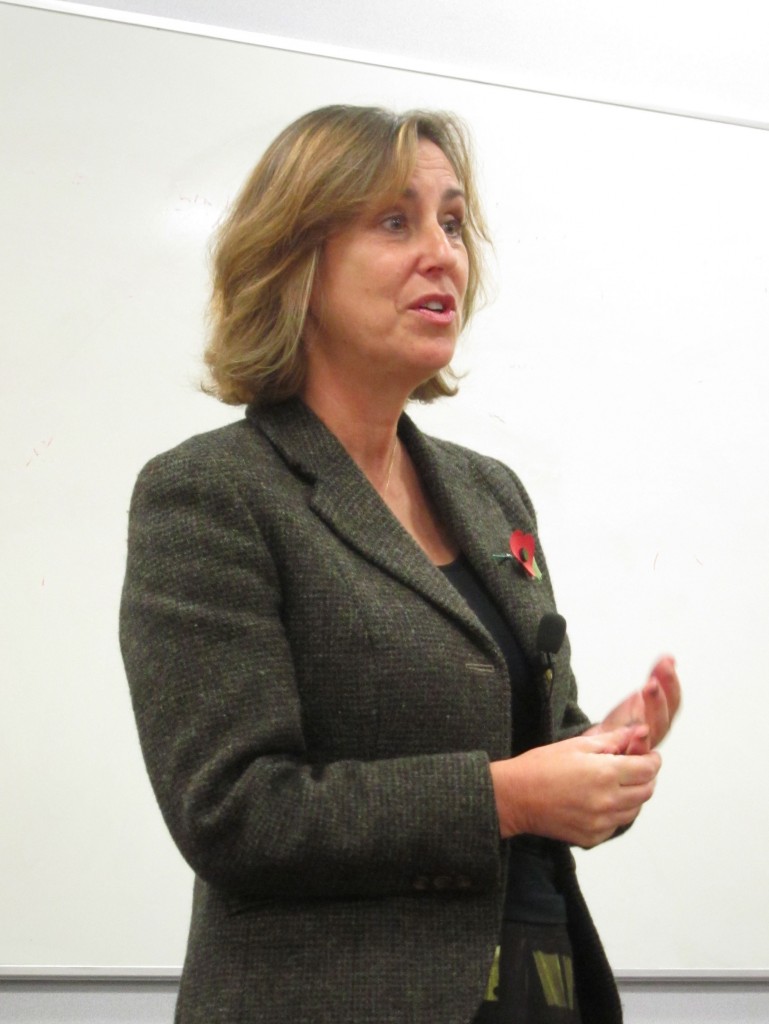 I knew that Kirst Wark hadn’t lost it when I saw her doorstepping Nick Clegg all the way up the aisle of Sheffield Town Hall on Election night 2010. He was not best pleased. It was then that I decided to try and get her to speak at Coventry Conversations, and last wednesday she did, delivering a masterclass for Coventry University’s journalism students.
I knew that Kirst Wark hadn’t lost it when I saw her doorstepping Nick Clegg all the way up the aisle of Sheffield Town Hall on Election night 2010. He was not best pleased. It was then that I decided to try and get her to speak at Coventry Conversations, and last wednesday she did, delivering a masterclass for Coventry University’s journalism students.
At that same Sheffield election count, Wark was about to do her first live stand-upper into the Dimbleby programme when two old ladies came by, “in a Moris Minor I think”. They told her that they’d not been able to vote, the queues at the polling station were too long and had shut before they could get in. A good yarn, especially as, in line with BBC post Hutton rules, it had two sources – both in the same car. Wark had to make a judgment call based on that hinterland of life in front of and behind the camera. She decided to broadcast thirty seconds later. She was right. She broke the story and it ran for hours overnight and for days afterwards. You cannot teach that nous.
Wark has now been in front of camera for nigh on three decades. She was a producer and director for BBC Scotland when the series producer suggested she take a try the other side of the lens on a political programme. She has never looked back. Today she commands the studio of Newsnight’s Review Show.
Wark left her Coventry town and gown audience in no doubt about the secret of good TV journalism – good research and hard work. Each interview is meticulously researched and brainstormed with her producers. “When you’ve done your homework, only then can you throw it away and respond using what you already know,” she said.
Wark was her own fiercest critic when it came to the interviews that had failed. When asked if she thought her style in the Alex Salmond interview in 2007, which was criticised for being rude and dismissive, was justified, Wark responded frankly: “It was overly aggressive and I later apologised”, she said. She told the audience that her favourite interviews were with Margaret Thatcher and Libertine Pete Doherty. Her least favourite was with disgraced Tory peer Lord Jeffrey Archer – “he was condescending”.
Wark stopped in Coventry on her way from her home in Scotland to London to present Newsnight the next evening. Her day would start early, she explained, with phone calls to the editor of the night at 9am and continue right through to transmission at 10.30pm. Newsnight satisfied her ‘nosiness’ but also meant she had to be constantly abreast of the world through reading, reading and more reading, she said.
She is buoyant about the state of journalism today. She believes no matter who the reporter or what the content, “as long as the journalism is rigorous and investigative it’s valid”. She added that if it helps to introduce a different demographic of viewer to news and current affairs, then programmes such as Sky’s Ross Kemp in Afghanistan have just as much place in the sphere as Newsnight.
So what’s next for Kirsty Wark? With a book and a documentary in the pipeline, as well as Newsnight and the successful Glasgow-based Review Show, ratings are as strong as ever and it appears that she will be a fixture on our screens for some time.
John Mair is a senior lecturer in broadcasting at Coventry University. He founded and runs the twice weekly Coventry Conversations.
